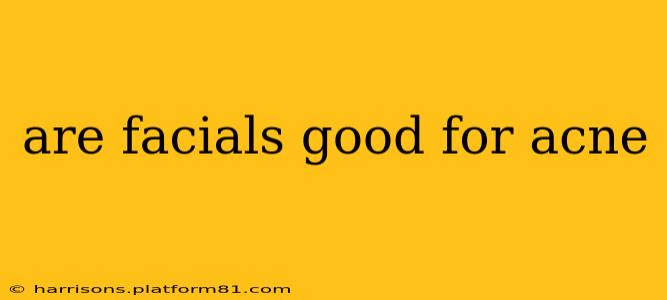Acne. That frustrating, persistent skin condition that affects millions. While over-the-counter treatments and prescription medications offer solutions, many are turning to facials as a potential complement or even primary treatment. But are facials truly good for acne? The answer, like most things related to skincare, is nuanced. It depends heavily on the type of facial, the individual's skin type and acne severity, and the expertise of the aesthetician.
This comprehensive guide explores the benefits and potential drawbacks of facials for acne, answering common questions and providing expert insights to help you make informed decisions about your skincare routine.
What Types of Facials Are Good for Acne-Prone Skin?
Not all facials are created equal. Some can actually exacerbate acne, while others can provide significant benefits. Here are some facial types that are often recommended for acne-prone skin:
-
Extractions: A crucial component of many acne facials, extractions involve carefully removing blackheads, whiteheads, and comedones (impacted pores). However, improper extraction can lead to scarring and inflammation, so it's crucial to find a skilled and experienced aesthetician.
-
Chemical Peels: These treatments use chemical solutions to exfoliate the skin, removing dead skin cells and promoting cell turnover. Different types of peels, such as salicylic acid or glycolic acid peels, are particularly beneficial for acne. The strength of the peel should be tailored to your skin type and acne severity.
-
Microdermabrasion: This procedure uses a device to gently exfoliate the skin's surface, improving skin texture and reducing the appearance of acne scars. It can be effective for mild to moderate acne.
-
High-Frequency Treatments: This involves applying a high-frequency wand to the skin, which is believed to kill acne-causing bacteria and reduce inflammation. It's often used in conjunction with other acne treatments.
Can Facials Make Acne Worse?
Yes, facials can potentially worsen acne if not performed correctly or if the wrong type of facial is chosen. Here's why:
-
Unsanitary Conditions: A dirty or unsanitary environment can introduce bacteria to the skin, leading to breakouts. Always choose a reputable spa with high hygiene standards.
-
Aggressive Extractions: Rough or forceful extractions can damage the skin, leading to inflammation, scarring, and further breakouts.
-
Incorrect Product Selection: Using the wrong products or inappropriate techniques can irritate the skin and trigger acne flare-ups.
-
Improper Aftercare: Following the facial, careful cleansing and moisturizing are crucial. Failing to follow aftercare instructions can lead to inflammation.
What to Expect During an Acne Facial?
An acne facial typically involves a series of steps:
- Cleansing: Thoroughly cleansing the skin to remove dirt, oil, and makeup.
- Exfoliation: Removing dead skin cells to unclog pores and promote cell turnover.
- Extractions (if applicable): Carefully removing blackheads, whiteheads, and comedones.
- Treatment: Applying specific treatments tailored to your skin type and concerns, such as chemical peels, high-frequency therapy, or masks.
- Moisturizing: Applying a lightweight moisturizer to hydrate the skin.
How Often Should I Get a Facial for Acne?
The frequency of acne facials depends on your skin's response and the type of treatment. Generally, it's recommended to start with one facial every 4-6 weeks and adjust the frequency based on your skin's reaction and your aesthetician's recommendations. Overdoing it can lead to irritation.
Are There Any Alternatives to Facials for Acne Treatment?
Yes, facials are not the only solution for acne. Other effective treatment options include:
- Over-the-counter topical treatments: Benzoyl peroxide, salicylic acid.
- Prescription medications: Retinoids, antibiotics, isotretinoin.
- Lifestyle changes: A healthy diet, stress management, and sufficient sleep.
Conclusion:
Facials can be a beneficial part of an acne treatment plan, but they are not a magic bullet. Choosing the right type of facial, finding a qualified aesthetician, and following proper aftercare are essential for achieving positive results. Always consult a dermatologist or aesthetician to determine the best course of action for your specific skin type and acne severity. Remember that a holistic approach, combining professional treatments with a consistent home skincare routine and lifestyle adjustments, usually yields the best results.
